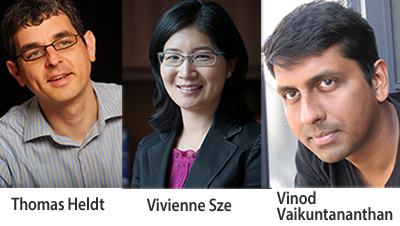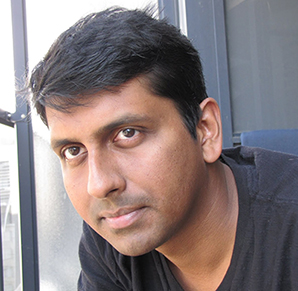Meet the newest members of the MIT Electrical Engineering and Computer Science faculty — Thomas Heldt, Assistant Professor of Electrical and Biomedical Engineering, Vivienne Sze, Assistant Professor of Electrical Engineering and Vinod Vaikuntanathan, Assistant Professor of Computer Science.
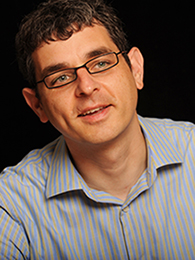
Thomas Heldt joined the EECS Department in July 2013 as Assistant Professor of Electrical and Biomedical Engineering. He was also appointed to MIT's new Institute for Medical Engineering and Science, where he holds the Hermann von Helmholtz Career Development Professorship. Thomas studied Physics at Johannes Gutenberg University, Germany, at Yale University and MIT. In 2004, he received the PhD degree in Medical Physics from MIT's Division of Health Sciences and Technology and commenced postdoctoral training at MIT's Laboratory for Electromagnetic and Electronics Systems. Prior to joining the faculty, Thomas was a Principal Research Scientist with MIT's Research Laboratory of Electronics, where he co-founded and co-directed (with Prof. George Verghese) the Computational Physiology and Clinical Inference Group.
Thomas's research interests focus on signal processing, mathematical modeling, and model identification to support real-time clinical decision making, monitoring of disease progression, and titration of therapy, primarily in neurocritical and neonatal critical care. In particular, Thomas is interested in developing a mechanistic understanding of physiologic systems, and in formulating appropriately chosen computational physiologic models for improved patient care. His research is conducted in close collaboration with colleagues at MIT and clinicians from Boston-area hospitals.
Thomas has been active in teaching Quantitative Physiology (with Prof. Roger Mark) and is currently co-teaching Cellular Biophysics and Neurophysiology (with Prof. Jay Han). He is looking forward to developing a course on Physiological Systems Modeling and Identification that puts equal emphasis on formulating mechanistic mathematical models of physiological systems, and on using these models to interpret clinical and physiological data.
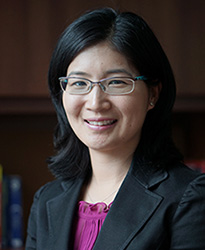 Vivienne Sze joined the EECS Department in August 2013 as an Assistant Professor and a member of RLE and MTL. She received the B.A.Sc. degree in Electrical Engineering from the University of Toronto in 2004, and the S.M. and Ph.D. degree in Electrical Engineering and Computer Science from MIT in 2006 and 2010, respectively. From September 2010 to July 2013, she was a Member of Technical Staff in the Systems and Applications R&D Center at Texas Instruments, where she designed low-power algorithms and architectures for video coding.
Vivienne Sze joined the EECS Department in August 2013 as an Assistant Professor and a member of RLE and MTL. She received the B.A.Sc. degree in Electrical Engineering from the University of Toronto in 2004, and the S.M. and Ph.D. degree in Electrical Engineering and Computer Science from MIT in 2006 and 2010, respectively. From September 2010 to July 2013, she was a Member of Technical Staff in the Systems and Applications R&D Center at Texas Instruments, where she designed low-power algorithms and architectures for video coding.
Her research focuses on pushing the power and performance limits through joint design of algorithms, architectures and circuits to build energy efficient and high performance systems for portable multimedia applications. Her work on implementation-friendly video compression algorithms was used in the development of the latest video coding standard HEVC/H.265.
She has received various awards for academic achievement including the Jin-Au Kong Outstanding Doctoral Thesis Prize in 2011, the 2008 A-SSCC Outstanding Design Award, the 2007 DAC/ISSCC Student Design Contest Award, the Natural Sciences and Engineering Research Council of Canada (NSERC) Julie Payette fellowship in 2004, the NSERC Postgraduate Scholarships in 2005 and 2007, and the Texas Instruments Graduate Woman's Fellowship for Leadership in Microelectronics in 2008. In 2012, she was selected by IEEE-USA as one of the “New Faces of Engineering”
Vinod Vaikuntanathan joined the EECS Department as an Assistant Professor of Computer Science in September 2013. No stranger to MIT, Vinod earned his SM and PhD in Computer Science in 2005 and 2008, respectively.
Following graduation from MIT, Vinod was the Josef Raviv Postdoctoral Fellow at IBM T.J. Watson Research Center (from 2008 – 2010), a Researcher in the Cryptography group at Microsoft Research, Redmond (from 2010 -- 2011), and an Assistant Professor in the Computer Science department at the University of Toronto (from 2011 -- 2013).
Prof. Vaikuntanathan's research is in the area of theoretical computer science, where he studies information-theoretic and computational techniques to achieve authenticity and privacy in computation and communication. In particular, he is interested in techniques for computing on encrypted data and programs including, fully homomorphic encryption, functional encryption and program obfuscation. He also develops new mathematical tools in cryptography, drawing from the theory of integer lattices. Prof. Vaikuntanathan was recently cited by the MIT News Office for his work with Prof. Shafi Goldwasser and Prof. Nickolai Zeldovich on securing the cloud while letting web servers process data without decrypting it, a work that they presented at the Association for Computing Machinery's 45th Symposium on the Theory of Computing in early June.
Vinod Vaikuntanathan is a recipient of the George M. Sprowls PhD thesis award from the MIT EECS Department, an Alfred P. Sloan research fellowship and a University of Toronto Connaught New Researcher award.
Date Posted:
Card Title Color:
Card Description:
Photo:
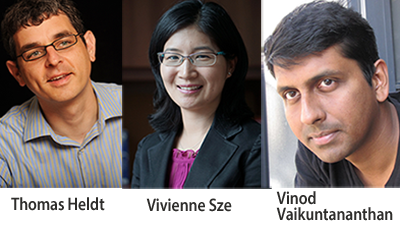
Card Wide Image:
